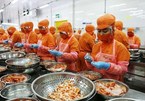Nguyen Canh Cuong, trade counsellor at the Vietnamese Embassy to the United Kingdom, talked about the bonanzas that lay ahead.
What benefits in trade and investment will the UK-Vietnam Free Trade Agreement (UVFTA) offer to Vietnam?
 |
| Nguyen Canh Cuong, trade counsellor at the Vietnamese Embassy to the United Kingdom |
The agreement will provide huge trade benefits to Vietnam quickly and directly, thanks to four key factors. Firstly, the UK’s market size is very big. The UK spends about $700 billion a year importing goods from all around the world. Secondly, the UVFTA immediately exempts import tariffs into the UK for almost all products sourced from Vietnam or under a relatively quick tariff-reducing roadmap of one, three, and 7-8 years.
Thirdly, the UVFTA has created competitive advantages for many products from Vietnam, such as agro-fishery products, footwear, rubber products, and wood products as compared to peers from China, Thailand, Malaysia, Indonesia, the Philippines, India, and Brazil, which are major trade rivals of Vietnam’s many products. However, these nations have yet to create an FTA with the UK.
Lastly, many Vietnamese enterprises have successfully established firm relations with partners in the UK, and they have products meeting the quality standards of the EU and the UK. These businesses can take advantage of the competitive advantages of the UVFTA more quickly than new enterprises in a bid to increase their market share. UK importers with already-forged cooperation with Vietnamese suppliers will also increase their imports from Vietnam in their global value chain.
In the first three months of 2021, Vietnam’s total export-import turnover with the UK hit over $1.63 billion, up 12.48 per cent on-year. This included nearly $1.47 billion worth of export turnover, up 14.74 per cent on-year though the UVFTA was just applied temporarily on January 1, 2021. Following direct trade benefits, the UVFTA will also bring indirect benefits to Vietnam. UK investors will increase the hunt for investment opportunities in Vietnam or shift their production bases from other locations to the country so that their products will be exempted from tariffs when being exported to the UK.
According to the Ministry of Planning and Investment, as of March 20, the UK’s direct investment into Vietnam hit $3.87 billion in registered capital for 441 projects. Will the trade deal help Vietnam attract more?
The UVFTA will not create direct benefits in the short- and mid-term, but will create positive effects in attracting investment in the long term. Together with Vietnam’s continued reform of policies, the UVFTA will encourage foreign investors in Vietnam to expand production and business. Some owners of UK businesses in China and Myanmar may also relocate their production establishments to Vietnam.
What items will immediately benefit from the agreement’s tariff slashes?
Items with immediate exemption of non-quota import tariffs include coffee, rambutan, mango, litchi, longan, dragon fruit, coconut, and pickle. Other items including shrimp, tuna, ground fish, fragrant rice, cassava starch, and other agricultural products will also be exempt from tariffs under quotas.
Industrial products with immediate tariff exemptions embrace bags, wallets, suitcases, protective shoes and sport shoes, underclothing, bathrobes, nightclothes, indoor clothing, swimwear, handkerchiefs, shawls, gloves, leggings, and kids’ clothing.
What should enterprises in Vietnam do to enjoy and take advantage of UVFTA benefits?
They have to meet requirements in the quality and production process under the standards of both the UK or the EU. Even though enterprises may have good products, if they have no professional English-language websites, they will not have opportunities to approach UK importers.
They should also partake in international fairs and exhibitions to showcase their products, in addition to using high-tech tools to approach and work with customers, especially during this time of COVID-19. If they cannot join online English-language meetings, they will miss many opportunities to export their products to the UK market. Currently big supermarkets and retailers from the UK tend to place direct orders from prestigious producers in order to diversify their product portfolios, seek innovation, and better control product quality and origin. So Vietnamese firms can register to become these retailers’ suppliers via their websites.
What challenges will the UVFTA bring to enterprises in Vietnam and the economy, and what solutions will be required?
In 2020, British firms exported goods worth over $600 million to Vietnam. The UVFTA can help those businesses increase exports under Vietnam’s tariff-reducing roadmap, so they can increase competition pressure on some Vietnamese firms in the years to come.
However, because the UK’s major export structure include aircraft, high-end cars, pharmaceuticals, machinery, electrical equipment, precious metals, whisky and wine, steel, crude oil, and optical equipment, it is forecasted that the competition pressure will impact on the equivalents imported from other nations, rather than on Vietnam’s products. The main reason is that the market segment of many domestically-made products is different from that of the UK’s similar products.
The key solutions needed to be carried out by Vietnamese enterprises are to raise their own competitiveness and actively participate in the regional and global value chains in order to become a factor that can create the added value for the national economy and the global economy.
VIR

UKVFTA - a boost to Vietnam-UK trade
After the UK-Vietnam Free Trade Agreement (UKVFTA) took effect on December 31, 2020, both sides saw impressive growth in their two-way trade though exports faced formidable challenges caused by the COVID-19 pandemic.